Holistic Palliative Care: Balancing Beliefs - Western Sydney Uni
VerifiedAdded on 2023/06/13
|5
|1359
|200
Essay
AI Summary
This essay discusses the importance of holistic care in palliative settings, emphasizing the integration of social, psychological, biological, and spiritual needs. It highlights how healthcare providers, particularly nurses, can provide comprehensive care by understanding patients' personal beliefs and values while maintaining their own. The essay also addresses the emotional challenges faced by palliative patients, such as loneliness, anxiety, and grief, and suggests strategies for nurses to cope with these emotions and provide compassionate care. Furthermore, it emphasizes the significance of cultural and spiritual sensitivity in delivering effective palliative care, advocating for the involvement of family and other resources when necessary. The document is available on Desklib, a platform offering a range of study tools and solved assignments for students.
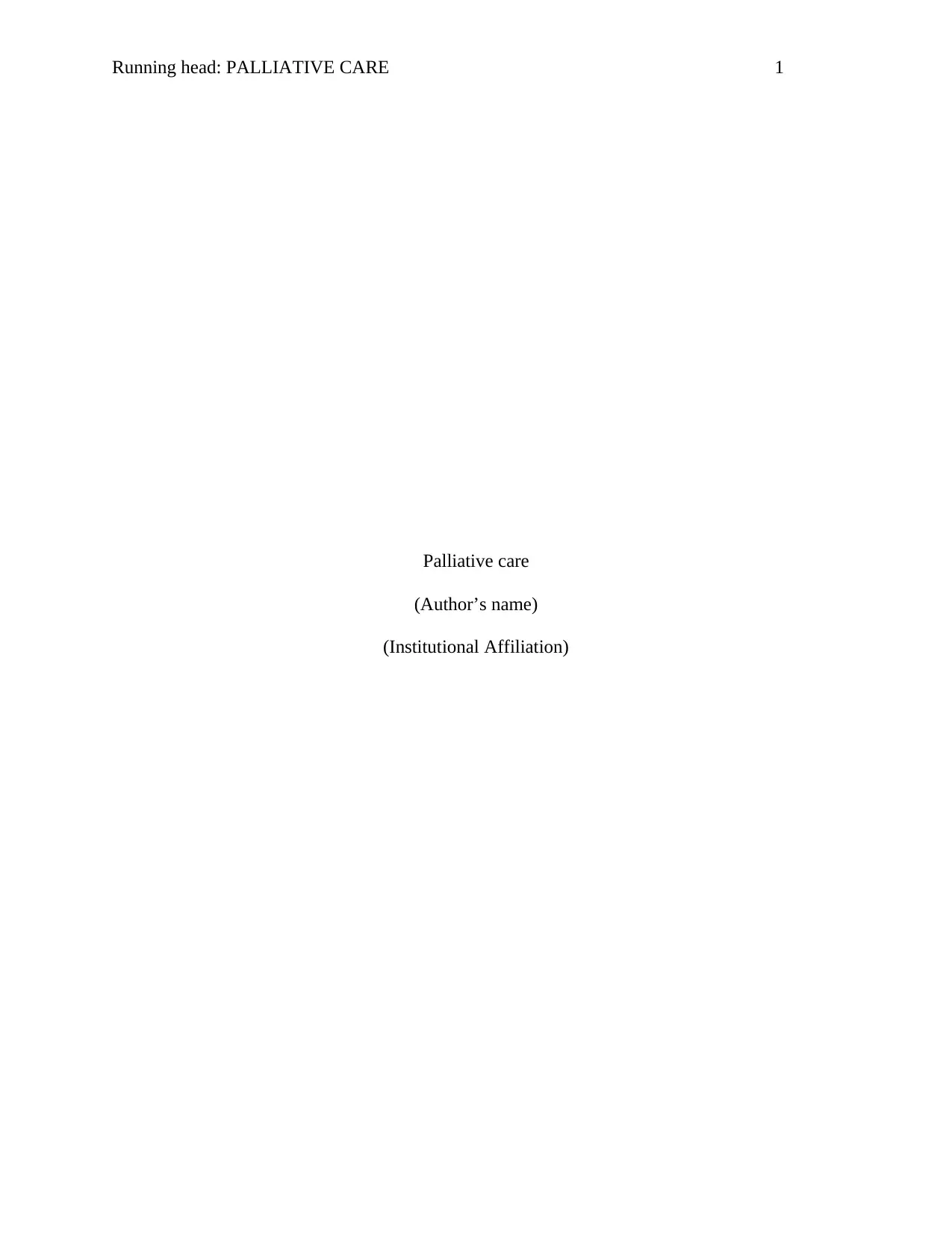
Running head: PALLIATIVE CARE 1
Palliative care
(Author’s name)
(Institutional Affiliation)
Palliative care
(Author’s name)
(Institutional Affiliation)
Paraphrase This Document
Need a fresh take? Get an instant paraphrase of this document with our AI Paraphraser
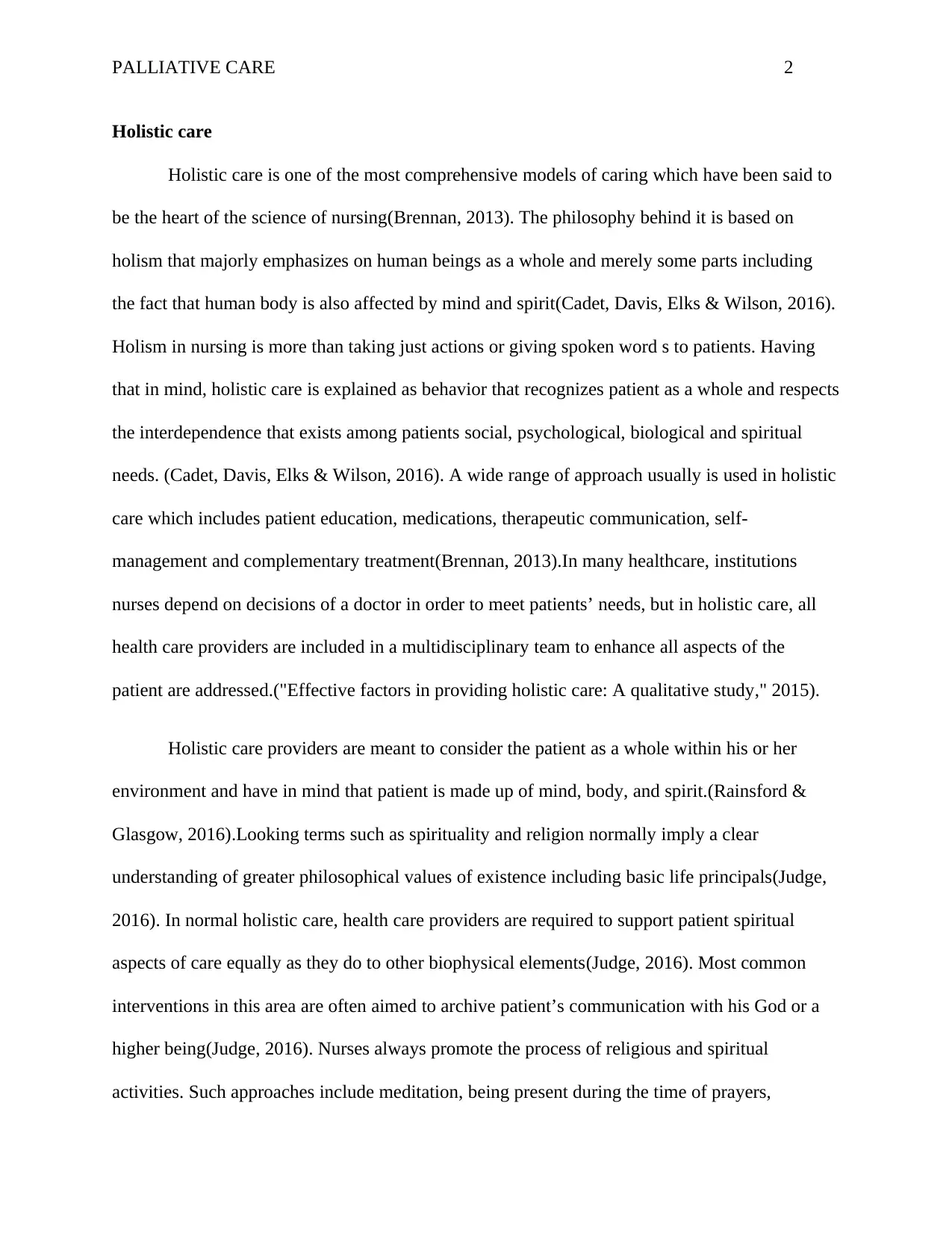
PALLIATIVE CARE 2
Holistic care
Holistic care is one of the most comprehensive models of caring which have been said to
be the heart of the science of nursing(Brennan, 2013). The philosophy behind it is based on
holism that majorly emphasizes on human beings as a whole and merely some parts including
the fact that human body is also affected by mind and spirit(Cadet, Davis, Elks & Wilson, 2016).
Holism in nursing is more than taking just actions or giving spoken word s to patients. Having
that in mind, holistic care is explained as behavior that recognizes patient as a whole and respects
the interdependence that exists among patients social, psychological, biological and spiritual
needs. (Cadet, Davis, Elks & Wilson, 2016). A wide range of approach usually is used in holistic
care which includes patient education, medications, therapeutic communication, self-
management and complementary treatment(Brennan, 2013).In many healthcare, institutions
nurses depend on decisions of a doctor in order to meet patients’ needs, but in holistic care, all
health care providers are included in a multidisciplinary team to enhance all aspects of the
patient are addressed.("Effective factors in providing holistic care: A qualitative study," 2015).
Holistic care providers are meant to consider the patient as a whole within his or her
environment and have in mind that patient is made up of mind, body, and spirit.(Rainsford &
Glasgow, 2016).Looking terms such as spirituality and religion normally imply a clear
understanding of greater philosophical values of existence including basic life principals(Judge,
2016). In normal holistic care, health care providers are required to support patient spiritual
aspects of care equally as they do to other biophysical elements(Judge, 2016). Most common
interventions in this area are often aimed to archive patient’s communication with his God or a
higher being(Judge, 2016). Nurses always promote the process of religious and spiritual
activities. Such approaches include meditation, being present during the time of prayers,
Holistic care
Holistic care is one of the most comprehensive models of caring which have been said to
be the heart of the science of nursing(Brennan, 2013). The philosophy behind it is based on
holism that majorly emphasizes on human beings as a whole and merely some parts including
the fact that human body is also affected by mind and spirit(Cadet, Davis, Elks & Wilson, 2016).
Holism in nursing is more than taking just actions or giving spoken word s to patients. Having
that in mind, holistic care is explained as behavior that recognizes patient as a whole and respects
the interdependence that exists among patients social, psychological, biological and spiritual
needs. (Cadet, Davis, Elks & Wilson, 2016). A wide range of approach usually is used in holistic
care which includes patient education, medications, therapeutic communication, self-
management and complementary treatment(Brennan, 2013).In many healthcare, institutions
nurses depend on decisions of a doctor in order to meet patients’ needs, but in holistic care, all
health care providers are included in a multidisciplinary team to enhance all aspects of the
patient are addressed.("Effective factors in providing holistic care: A qualitative study," 2015).
Holistic care providers are meant to consider the patient as a whole within his or her
environment and have in mind that patient is made up of mind, body, and spirit.(Rainsford &
Glasgow, 2016).Looking terms such as spirituality and religion normally imply a clear
understanding of greater philosophical values of existence including basic life principals(Judge,
2016). In normal holistic care, health care providers are required to support patient spiritual
aspects of care equally as they do to other biophysical elements(Judge, 2016). Most common
interventions in this area are often aimed to archive patient’s communication with his God or a
higher being(Judge, 2016). Nurses always promote the process of religious and spiritual
activities. Such approaches include meditation, being present during the time of prayers,
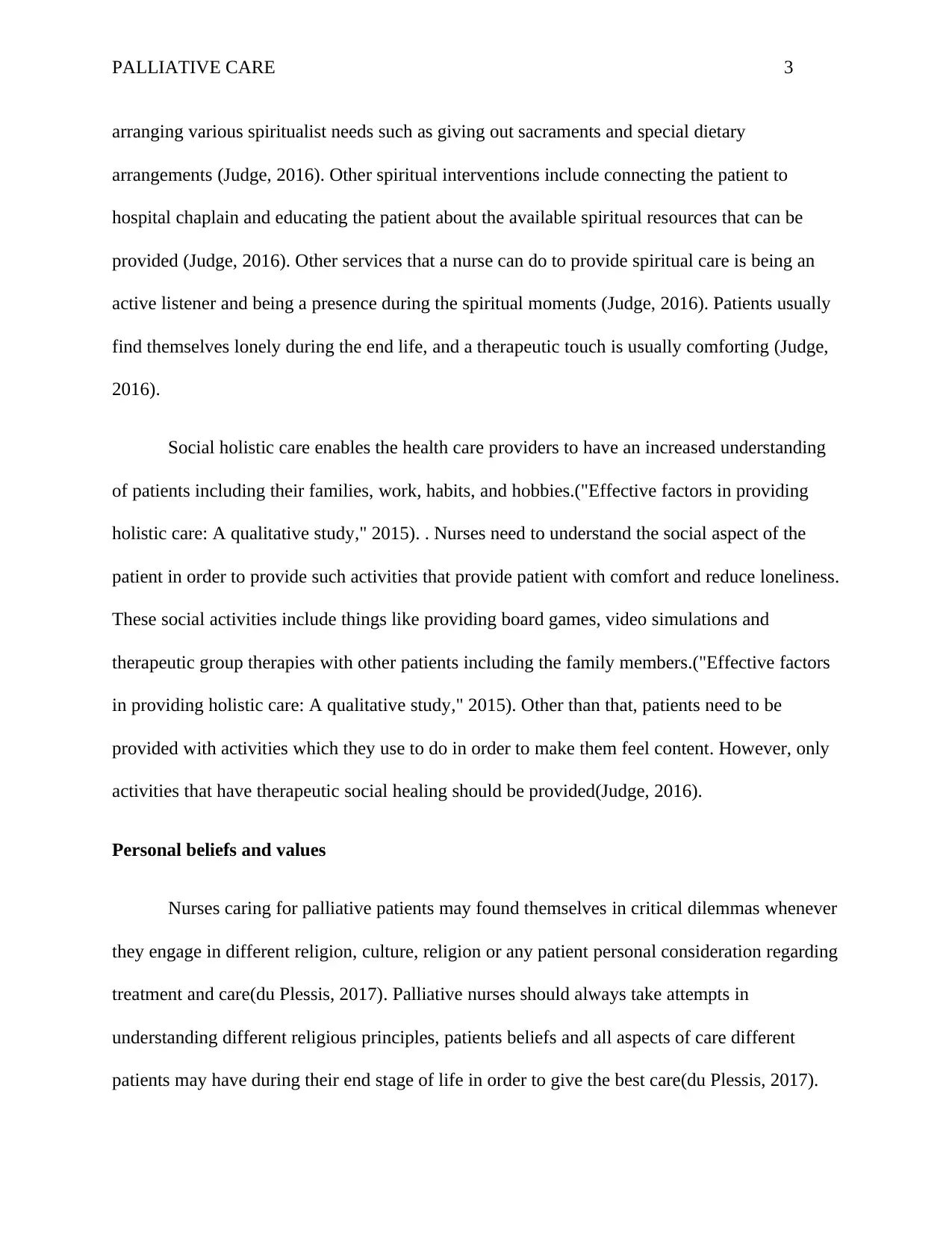
PALLIATIVE CARE 3
arranging various spiritualist needs such as giving out sacraments and special dietary
arrangements (Judge, 2016). Other spiritual interventions include connecting the patient to
hospital chaplain and educating the patient about the available spiritual resources that can be
provided (Judge, 2016). Other services that a nurse can do to provide spiritual care is being an
active listener and being a presence during the spiritual moments (Judge, 2016). Patients usually
find themselves lonely during the end life, and a therapeutic touch is usually comforting (Judge,
2016).
Social holistic care enables the health care providers to have an increased understanding
of patients including their families, work, habits, and hobbies.("Effective factors in providing
holistic care: A qualitative study," 2015). . Nurses need to understand the social aspect of the
patient in order to provide such activities that provide patient with comfort and reduce loneliness.
These social activities include things like providing board games, video simulations and
therapeutic group therapies with other patients including the family members.("Effective factors
in providing holistic care: A qualitative study," 2015). Other than that, patients need to be
provided with activities which they use to do in order to make them feel content. However, only
activities that have therapeutic social healing should be provided(Judge, 2016).
Personal beliefs and values
Nurses caring for palliative patients may found themselves in critical dilemmas whenever
they engage in different religion, culture, religion or any patient personal consideration regarding
treatment and care(du Plessis, 2017). Palliative nurses should always take attempts in
understanding different religious principles, patients beliefs and all aspects of care different
patients may have during their end stage of life in order to give the best care(du Plessis, 2017).
arranging various spiritualist needs such as giving out sacraments and special dietary
arrangements (Judge, 2016). Other spiritual interventions include connecting the patient to
hospital chaplain and educating the patient about the available spiritual resources that can be
provided (Judge, 2016). Other services that a nurse can do to provide spiritual care is being an
active listener and being a presence during the spiritual moments (Judge, 2016). Patients usually
find themselves lonely during the end life, and a therapeutic touch is usually comforting (Judge,
2016).
Social holistic care enables the health care providers to have an increased understanding
of patients including their families, work, habits, and hobbies.("Effective factors in providing
holistic care: A qualitative study," 2015). . Nurses need to understand the social aspect of the
patient in order to provide such activities that provide patient with comfort and reduce loneliness.
These social activities include things like providing board games, video simulations and
therapeutic group therapies with other patients including the family members.("Effective factors
in providing holistic care: A qualitative study," 2015). Other than that, patients need to be
provided with activities which they use to do in order to make them feel content. However, only
activities that have therapeutic social healing should be provided(Judge, 2016).
Personal beliefs and values
Nurses caring for palliative patients may found themselves in critical dilemmas whenever
they engage in different religion, culture, religion or any patient personal consideration regarding
treatment and care(du Plessis, 2017). Palliative nurses should always take attempts in
understanding different religious principles, patients beliefs and all aspects of care different
patients may have during their end stage of life in order to give the best care(du Plessis, 2017).
⊘ This is a preview!⊘
Do you want full access?
Subscribe today to unlock all pages.

Trusted by 1+ million students worldwide
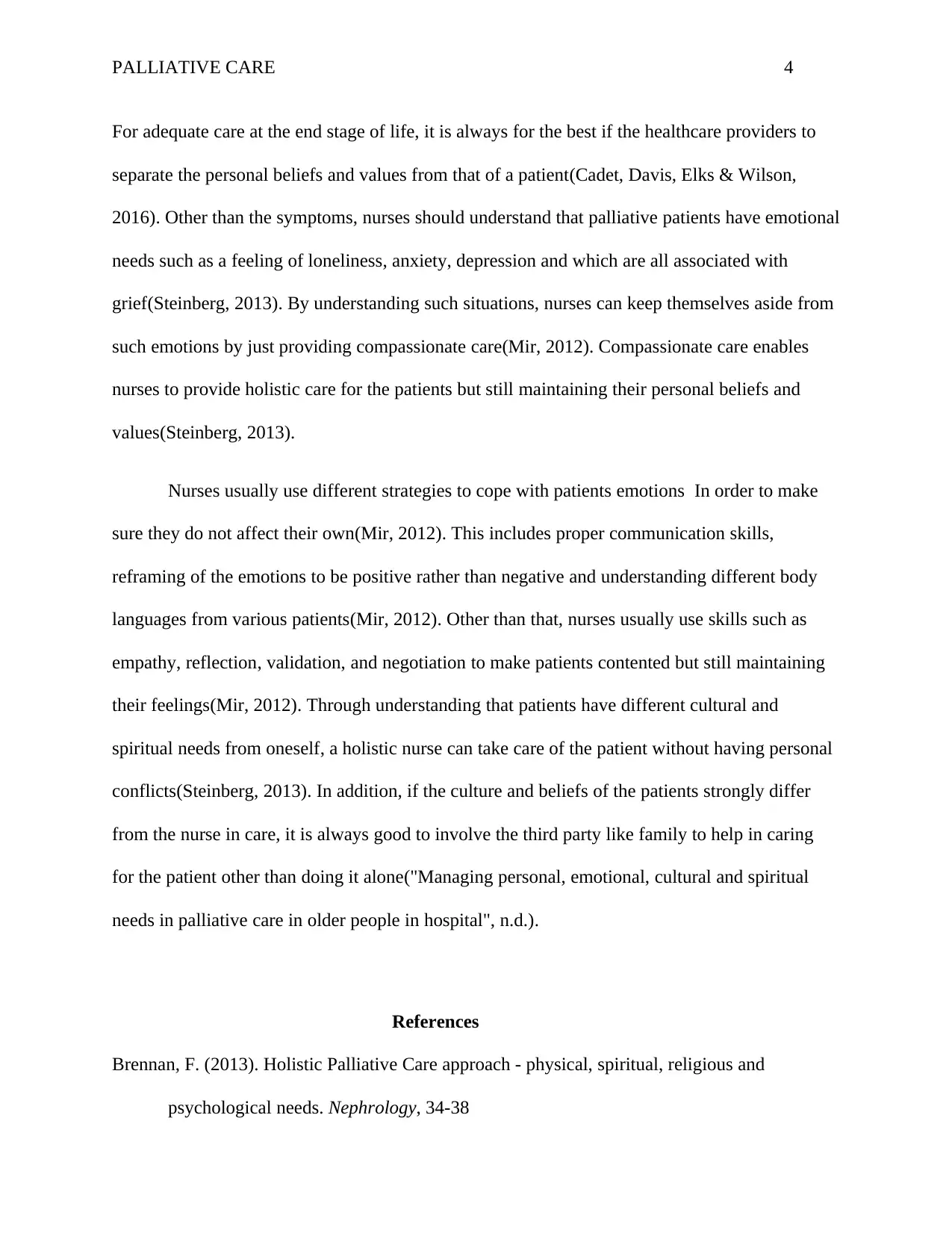
PALLIATIVE CARE 4
For adequate care at the end stage of life, it is always for the best if the healthcare providers to
separate the personal beliefs and values from that of a patient(Cadet, Davis, Elks & Wilson,
2016). Other than the symptoms, nurses should understand that palliative patients have emotional
needs such as a feeling of loneliness, anxiety, depression and which are all associated with
grief(Steinberg, 2013). By understanding such situations, nurses can keep themselves aside from
such emotions by just providing compassionate care(Mir, 2012). Compassionate care enables
nurses to provide holistic care for the patients but still maintaining their personal beliefs and
values(Steinberg, 2013).
Nurses usually use different strategies to cope with patients emotions In order to make
sure they do not affect their own(Mir, 2012). This includes proper communication skills,
reframing of the emotions to be positive rather than negative and understanding different body
languages from various patients(Mir, 2012). Other than that, nurses usually use skills such as
empathy, reflection, validation, and negotiation to make patients contented but still maintaining
their feelings(Mir, 2012). Through understanding that patients have different cultural and
spiritual needs from oneself, a holistic nurse can take care of the patient without having personal
conflicts(Steinberg, 2013). In addition, if the culture and beliefs of the patients strongly differ
from the nurse in care, it is always good to involve the third party like family to help in caring
for the patient other than doing it alone("Managing personal, emotional, cultural and spiritual
needs in palliative care in older people in hospital", n.d.).
References
Brennan, F. (2013). Holistic Palliative Care approach - physical, spiritual, religious and
psychological needs. Nephrology, 34-38
For adequate care at the end stage of life, it is always for the best if the healthcare providers to
separate the personal beliefs and values from that of a patient(Cadet, Davis, Elks & Wilson,
2016). Other than the symptoms, nurses should understand that palliative patients have emotional
needs such as a feeling of loneliness, anxiety, depression and which are all associated with
grief(Steinberg, 2013). By understanding such situations, nurses can keep themselves aside from
such emotions by just providing compassionate care(Mir, 2012). Compassionate care enables
nurses to provide holistic care for the patients but still maintaining their personal beliefs and
values(Steinberg, 2013).
Nurses usually use different strategies to cope with patients emotions In order to make
sure they do not affect their own(Mir, 2012). This includes proper communication skills,
reframing of the emotions to be positive rather than negative and understanding different body
languages from various patients(Mir, 2012). Other than that, nurses usually use skills such as
empathy, reflection, validation, and negotiation to make patients contented but still maintaining
their feelings(Mir, 2012). Through understanding that patients have different cultural and
spiritual needs from oneself, a holistic nurse can take care of the patient without having personal
conflicts(Steinberg, 2013). In addition, if the culture and beliefs of the patients strongly differ
from the nurse in care, it is always good to involve the third party like family to help in caring
for the patient other than doing it alone("Managing personal, emotional, cultural and spiritual
needs in palliative care in older people in hospital", n.d.).
References
Brennan, F. (2013). Holistic Palliative Care approach - physical, spiritual, religious and
psychological needs. Nephrology, 34-38
Paraphrase This Document
Need a fresh take? Get an instant paraphrase of this document with our AI Paraphraser
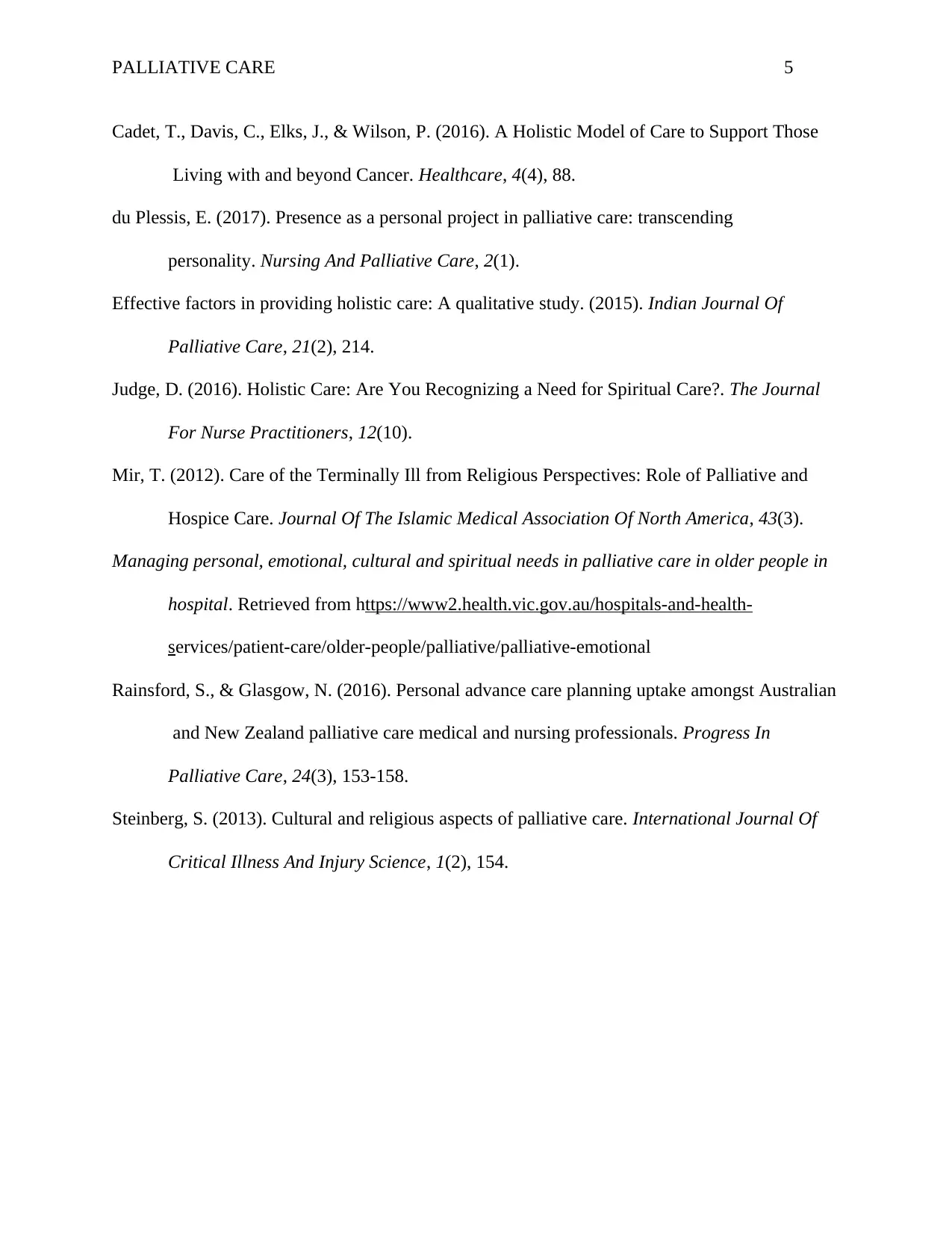
PALLIATIVE CARE 5
Cadet, T., Davis, C., Elks, J., & Wilson, P. (2016). A Holistic Model of Care to Support Those
Living with and beyond Cancer. Healthcare, 4(4), 88.
du Plessis, E. (2017). Presence as a personal project in palliative care: transcending
personality. Nursing And Palliative Care, 2(1).
Effective factors in providing holistic care: A qualitative study. (2015). Indian Journal Of
Palliative Care, 21(2), 214.
Judge, D. (2016). Holistic Care: Are You Recognizing a Need for Spiritual Care?. The Journal
For Nurse Practitioners, 12(10).
Mir, T. (2012). Care of the Terminally Ill from Religious Perspectives: Role of Palliative and
Hospice Care. Journal Of The Islamic Medical Association Of North America, 43(3).
Managing personal, emotional, cultural and spiritual needs in palliative care in older people in
hospital. Retrieved from https://www2.health.vic.gov.au/hospitals-and-health-
services/patient-care/older-people/palliative/palliative-emotional
Rainsford, S., & Glasgow, N. (2016). Personal advance care planning uptake amongst Australian
and New Zealand palliative care medical and nursing professionals. Progress In
Palliative Care, 24(3), 153-158.
Steinberg, S. (2013). Cultural and religious aspects of palliative care. International Journal Of
Critical Illness And Injury Science, 1(2), 154.
Cadet, T., Davis, C., Elks, J., & Wilson, P. (2016). A Holistic Model of Care to Support Those
Living with and beyond Cancer. Healthcare, 4(4), 88.
du Plessis, E. (2017). Presence as a personal project in palliative care: transcending
personality. Nursing And Palliative Care, 2(1).
Effective factors in providing holistic care: A qualitative study. (2015). Indian Journal Of
Palliative Care, 21(2), 214.
Judge, D. (2016). Holistic Care: Are You Recognizing a Need for Spiritual Care?. The Journal
For Nurse Practitioners, 12(10).
Mir, T. (2012). Care of the Terminally Ill from Religious Perspectives: Role of Palliative and
Hospice Care. Journal Of The Islamic Medical Association Of North America, 43(3).
Managing personal, emotional, cultural and spiritual needs in palliative care in older people in
hospital. Retrieved from https://www2.health.vic.gov.au/hospitals-and-health-
services/patient-care/older-people/palliative/palliative-emotional
Rainsford, S., & Glasgow, N. (2016). Personal advance care planning uptake amongst Australian
and New Zealand palliative care medical and nursing professionals. Progress In
Palliative Care, 24(3), 153-158.
Steinberg, S. (2013). Cultural and religious aspects of palliative care. International Journal Of
Critical Illness And Injury Science, 1(2), 154.
1 out of 5
Related Documents
Your All-in-One AI-Powered Toolkit for Academic Success.
+13062052269
info@desklib.com
Available 24*7 on WhatsApp / Email
![[object Object]](/_next/static/media/star-bottom.7253800d.svg)
Unlock your academic potential
Copyright © 2020–2026 A2Z Services. All Rights Reserved. Developed and managed by ZUCOL.





